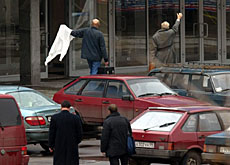
Swiss doctors to treat Russian hostages

Switzerland is to send doctors to treat hostages being held in a Moscow theatre by Chechen rebels. Swiss personnel have already been instrumental in securing the release of some hostages.
The Swiss foreign ministry said Russia had requested the doctors and that two – including a psychiatrist – would leave for Moscow on Friday.
Foreign ministry spokesman, Manuel Sager, told swissinfo that the Russian authorities as well as other foreign diplomats had specifically asked Switzerland to send personnel.
The doctors will join several Swiss already at the scene, including the head of International Committee of the Red Cross (ICRC) in Russia, Michel Minnig.
He has delivered medical supplies to the hostages on at least three occasions and personally helped to secure the release of many of the 20 people – 11 of them children – freed since Thursday.
The ICRC said two teams entered the theatre on Friday morning and came out with eight children, one of them a 10-year-old Swiss resident.
Released
Seven other hostages were released late on Thursday and the hostage takers have indicated that they may be prepared to release all 75 foreigners being held.
One hostage was killed on Thursday and her body removed from the theatre by doctors.
Around 60 foreigners are among the hostages, including nationals from Switzerland, the United States, Australia, Britain, Germany and Austria.
That would still leave more than 600 Russian hostages in the hands of the rebels, who are demanding that Russia withdraw its troops from Chechnya. They are heavily armed and media reports quote hostages as saying that they have explosives strapped to their bodies and have mined the building.
Russia has asked the ICRC to allow Minnig to negotiate with the hostage takers. The organisation’s official policy is that its personnel do not negotiate in such situations, but Minnig has held talks with the rebels on the three occasions when he delivered medicine and brought hostages out of the building.
Past experience
The Moscow siege is not the first time that Minnig has been involved in a hostage crisis. The Swiss was the head of the ICRC’s delegation in Peru in 1996 when Tupac Amaru guerrillas took nearly 700 people hostage at the Japanese embassy in Lima.
Minnig, who was having dinner in the embassy at the time, became the official mediator between the hostage takers and the government. The crisis was to last 126 days before Peruvian troops were sent in.
At the time, Minnig said the ICRC’s involvement was primarily humanitarian. “We were part of the negotiations as far as humanitarian matters were at stake. Among them the situation inside the residence, but also about the possibility of a peaceful solution.”
Minnig managed to get most of the hostages freed, despite the government refusing to free 440 Tupac Amaru prisoners it held. By the time troops stormed the compound, there were only 72 hostages left inside the embassy.
The attack carried out by the army wasn’t a total success though – 14 of the hostage-takers were killed, along with one hostage and two soldiers.
The Red Cross negotiator had said at the time that the result of his talks had left him with mixed feelings. But he did believe his role as a neutral intermediary had been worthwhile.
After leaving Peru in 1997, Minnig also worked in Iraq before taking up his current position in Moscow in three years ago. Among the Moscow delegation’s duties are visits to Chechen prisoners held in Russian jails.
swissinfo
Around 40 heavily-armed Chechen separatists are holding hundreds hostage inside a Moscow theatre.
They are demanding that Russia end the war in Chechnya and pull out its troops.
Russia has Switzerland to send doctors to treat the hostages.
The ICRC has already secured the release of some hostages during medicine deliveries.

In compliance with the JTI standards
More: SWI swissinfo.ch certified by the Journalism Trust Initiative



























You can find an overview of ongoing debates with our journalists here . Please join us!
If you want to start a conversation about a topic raised in this article or want to report factual errors, email us at english@swissinfo.ch.